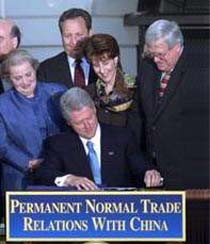CLINTON'S GRANTING PNTR TO CHINA REVISITED
As I watch with unease the US explosive trade deficits with China and its effects on the American-Chinese balance of economic, strategic and moral power, I cannot but remember that this is part of the"proud" legacy of the Clinton administration decision to stop treating China as the Communists dictatorship it is and start treating it as a NORMAL state by granting it permanent status of a most favorite nation which Albright renamed"normal" status. The change freed China from a yearly review of its human rights record and enabled China to join the WTO.
The selling point?
Such treatment would benefit the USA economically and promote reform in China!
The Agreement Strengthens Our Ability To Ensure Fair Trade And To Protect Ohio Agricultural And Manufacturing Base From Import Surges, Unfair Pricing, And Abusive Investment Practices Such As Offsets Or Forced Technology Transfer. Prior to the negotiations, Democrats and Republicans in Congress raised legitimate concerns about the importance of safeguards against unfair competition. As a result, no agreement on WTO accession has ever contained stronger measures to strengthen guarantees of fair trade and to address practices that distort trade and investment. . . .China’s Accession Will Help Promote Reform In China And Create A Safer World. The agreement will encourage Chinese leaders to move in the direction of meeting the demands of the Chinese people for openness, accountability, and reform.
Well, China is less open today than it was ten years ago and its ability to control its economy has placed the rest of the world in a significant disadvantage. Moreover, as Eswar S. Prasad of Brookings notes, it resulted in a"lopsided nature of trade and financial flows between the U.S. and China" which"has complicated this relationship, tightening the economic entanglements between the two economies and making them more contentious." The heart of the matter is the fallacy of treating democratic and totalitarian states as equals. In a letter to the WSJ Dan DiMicco writes:
China has been practicing beggar-thy-neighbor currency protectionism for years with detrimental consequences for the U.S. and global economy.Chinese currency manipulation has led to our country's staggering trade deficit and the loss of six million U.S. manufacturing jobs over the past decade. It is not just a problem for the U.S. This practice also hurts the economies of Europe, Japan and the poorest developing countries.
While you seem unconcerned by global trade imbalances, these imbalances have been at the heart of this economic crisis, as Paul Volcker and others have noted. . . .
The reality is that our free trade system is rules-based. When governments ignore or break the rules by which we all agreed to trade, then our businesses are forced to compete against governments, which bring their full weight to bear to make sure their domestic industry succeeds. In order for the world to restore balance in global trade and maintain the integrity of our rules-based free trade system, mercantilist practices like currency manipulation must end.
The WSJ editors recommend demanding China give up control over her currency. In other words, that it stop being totalitarian:
One solution would be to make the yuan convertible, and let capital and trade flows adjust through private markets rather than the Chinese central bank. This is how Germany recycles its trade surplus. A one-time small revaluation to, say, 6.5 yuan to the dollar accompanied by convertibility would help with global adjustment while avoiding the perils of Japan-like deflation.The Chinese government resists open capital markets because it fears less political control. At least at first a convertible yuan might also lead to a surge in capital outflows from China as Chinese companies and individuals diversified their currency holdings and investments. But over time, and probably quickly, markets would adjust and reach a new equilibrium. Convertibility would also increase the domestic pressure for China to further liberalize its financial system.
Dream on . . . . China thinks so little of this recommendation that it posted this editorial on its website pleased that it opposes the more achievable, though inferior solution of Remninbi devaluation.
Be that as it may, If the Obama administration finds itself forced to pretend (given its bond sales, it cannot afford to do so in a serious manner) to confront China, it is because Bill Clinton gave up the stick of yearly review of MFN and replaced it with the carrots of the PNTR and membership in the WTO. It is a small wonder that after slapping Hilary on the issue of Iran, Putin is pushing her for a similar WTO deal. Putin knows, as Ahmadinejad does, that he is dealing with yet another administration practicing an incentives only"smart" diplomacy and is savvy enough to take full advantage of it:
Putin tells Clinton to help Russia with WTO bid * Putin greets Clinton with litany of trade complaints
It works like a charm - Clinton: U.S. supports Russia’s accession to WTO"
Ahmadinejad does not have to worry report Russian papers. Russia and China are playing hide and go seek with US:
In the opinion of a UN diplomat, Russia will finally determine its position on sanctions only when China formulates its own. In the past the Chinese have hidden behind Russia on sanctions, while now it is the other way around, the diplomat quoted The Financial Times as saying on Friday.Russia's stance leaves little hope for introducing really effective measures against Iran, believes Vladimir Dvorkin, chief researcher at the Russian Academy of Sciences' Institute of World Economy and International Relations. It is this opposition that stands in the way of the discussion on sanctions.
If only Israel stopped building apartments . . .

